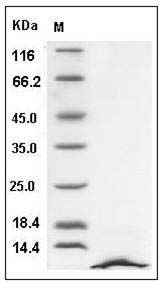-
Product Name
Human CXCL12 / SDF-1 beta (isoform a) recombinant protein
- Documents
-
Description
The human stromal cell-derived factor-1 (SDF1), also known as CXCL12, is a small (8 kDa) cytokine highly conserved chemotactic cytokine belonging to the large family of CXC chemokines. SDF1 is expressed in two isoforms from a single gene that encodes two splice variants, SDF1α and SDF1β, which are identical except for the four residues present in the C-terminus of SDF1β but absent from SDF1α. The chemokine CXCL12 [stromal cell-derived factor-1 (SDF-1)] binds primarily to CXC receptor 4 (CXCR4; CD184). The binding of CXCL12 to CXCR4 induces intracellular signaling through several divergent pathways initiating signals related to chemotaxis, cell survival and/or proliferation, increase in intracellular calcium, and gene transcription. CXCL12 and CXCR4 that have been widely characterized in peripheral tissues and delineate their main functions in the CNS. Extensive evidence supports CXCL12 as a key regulator for early development of the CNS. In the mature CNS, CXCL12 modulates neurotransmission, neurotoxicity and neuroglial interactions. CXCL12 has crucial roles in the formation of multiple organ systems during embryogenesis and in the regulation of bone marrow haematopoiesis and immune function in the postnatal organism. Although considered an important factor in normal bone metabolism, recent studies implicate CXCL12 in the pathogenesis of several diseases involving the skeleton, including rheumatoid arthritis and cancers that metastasize to bone. The CXCL12/CXCR4 axis is involved in tumor progression, angiogenesis, metastasis, and survival. Pathologically enhanced CXCL12 signaling may promote the formation of new vessels through recruiting circulating endothelial progenitor cells or directly enhancing the migration/growth of endothelial cells. Therefore, CXCL12 signaling represents an important mechanism that regulates brain tumor angiogenesis/vasculogenesis and may provide potential targets for anti-angiogenic therapy in malignant gliomas.
-
Protein name
Stromal cell-derived factor 1
-
Protein short names
TLSF-A; SDF1A; TPAR1; SDF-1B; TLSF-B; IRH; TLSFB; TLSFA; TLSF; AI174028; PBSF; SCYB12; SDF-1A; SDF1; CXCL12; CHEMOKINE (C-X-C MOTIF) LIGAND 12 (STROMAL CELL-DERIVED FACTOR 1); SDF1B
-
Uniprot ID
P48061
-
Gene Name
CXCL12; SDF1; SDF1A; SDF1B
-
Source/Expression Host
E. coli
-
Expression Plasmid/cDNA
A DNA sequence encoding the human CXCL12 isoform alpha (P48061-2) (Lys 22-Lys 89) was expressed and purified.
-
Protein Species
Human
-
Molecular weight
The recombinant human CXCL12 consists of 68 amino acids and predicts a molecular mass of 8 KDa.
-
Purity
> 97 % as determined by SDS-PAGE
-
Validations

Human CXCL12 / SDF-1 Protein (isoform a) SDS-PAGE
Related Products / Services
Please note: All products are "FOR RESEARCH USE ONLY AND ARE NOT INTENDED FOR DIAGNOSTIC OR THERAPEUTIC USE"
